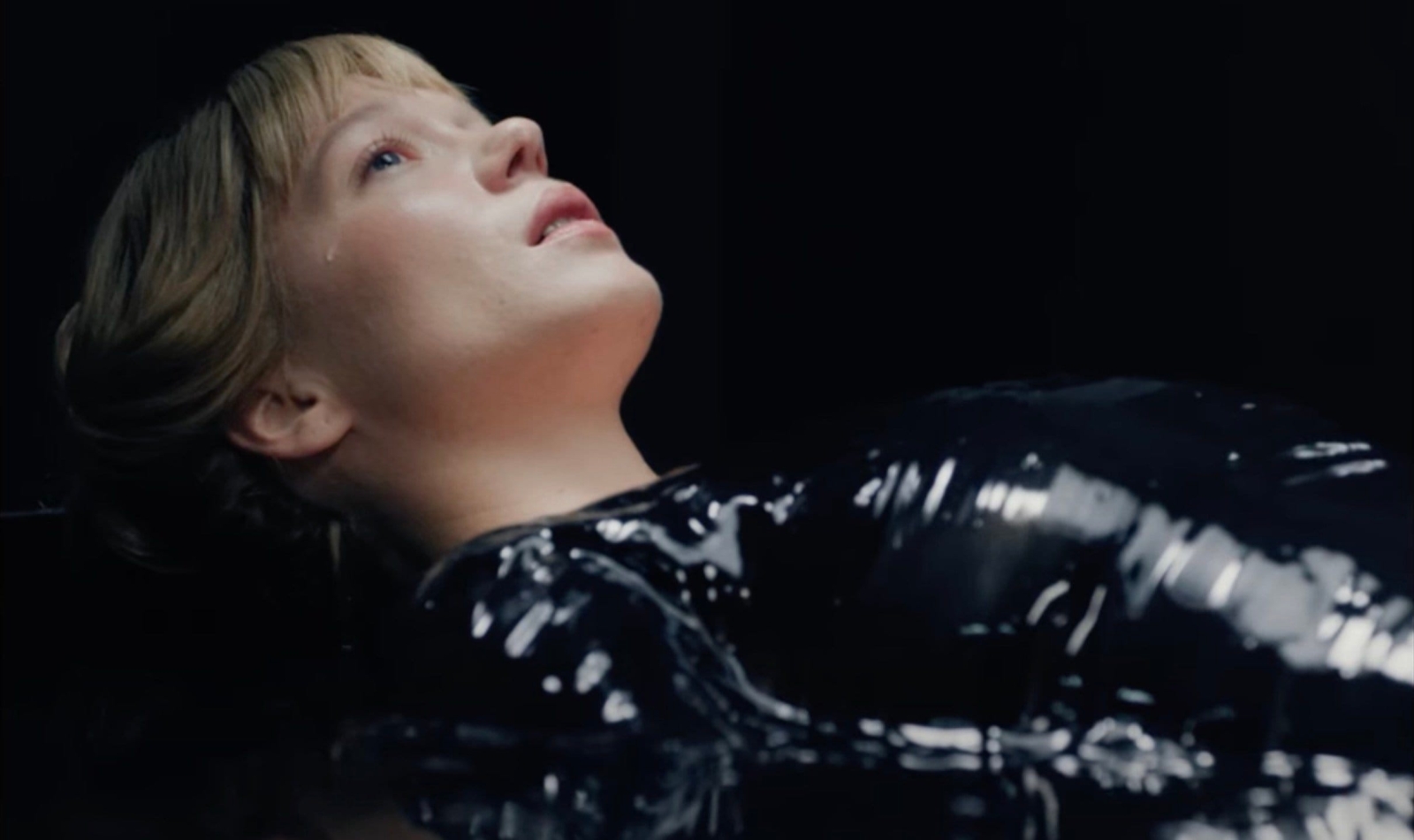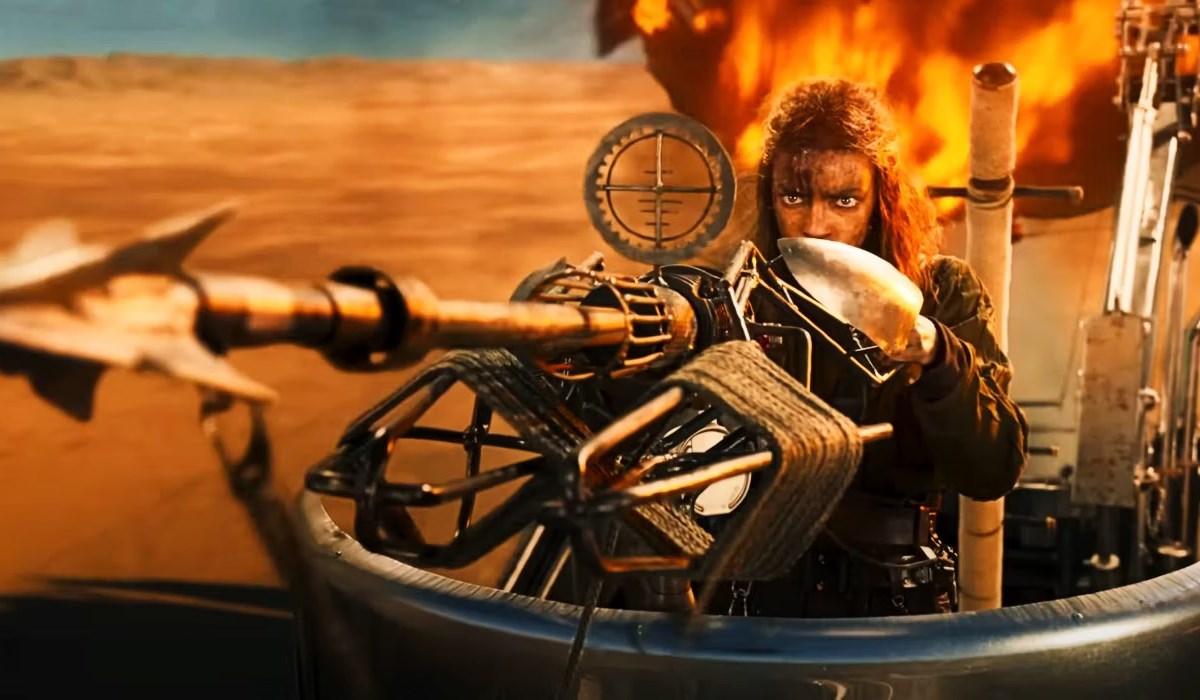Movie Reviews
Film review: Musical theater meets mockumentary in ‘Theater Camp’

Among the low-hanging fruits of satire, sleepaway theater camps would dangle about as low as social-media influencers and Def Leppard cover bands.
But “Theater Camp,” a new comedy by Molly Gordon and Nick Lieberman, energetically wades into the kind of mockumentary territory Christopher Guest would approve of. The spirit of “Best in Show” and “Waiting for Guffman” is often present, for better and worse, in Gordon and Lieberman’s film, which first debuted at Sundance earlier this year.
But theirs is a much more earnest, loving lampoon, made by a group of friends with obvious affection for musical theater. Gordon and Lieberman co-wrote the script with Ben Platt and Noah Galvin, expanding their 2020 18-minute short. The result is something too tame for rich parody, but knowing enough to be kind of sweet. “Theater Camp,” at least, has the song and dance part down pat.
The upstate New York camp of AdirondACTS has been pluckily kept running for years by its founder, Joan (Amy Sedaris). She’s intended to be the main character of a documentary on the camp. But in the opening moments of the film, while Joan and manager Rita (Caroline Aaron) are out recruiting campers, she’s knocked into a coma by strobe lights in a middle school production of “Bye Bye Birdie.”
It’s a funny enough gag but a crushing blow to the film. Taking Amy Sedaris off screen in a mockumentary that might have starred her is like killing Fred Astaire off in the first number. You just don’t do it. So who are our characters instead? Joan’s son, Troy (Jimmy Tatro), comes in to run the camp. He’s pretty much their worst nightmare: a social media-promoting finance bro who always avoided his mother’s camp because, he says, he was busy doing “dope (expletive)” instead.
When Troy opens a new summer season, plenty of eyerolls follow — especially from Amos (Platt), the head of drama, and his close friend and collaborator Rebecca-Diane (Gordon). They nevertheless forge ahead with the summer’s programs, including “The Crucible Jr.,” an “immersive” “Cats” and their original piece, “Joan, Still.”
Life at the camp gets underway while the threat of foreclosure lurks and a more well-to-do rival camp looks to take over. The inside jokes fly fast and frequent. There’s a group of finger-snapping “Fosse kids,” a designated “Meryl Day,” bedtime stories where the villain is non-union and exaggerated stakes on stage. “Joan, Still” is said to be such an ambitious work of theater that Amos promises its child cast: “This will break you.”
All of this clever but too expected to be especially funny. The movie, the directorial debut for Gordon and Lieberman, loosely bounces between a large cast of characters, who know their parts well — maybe too well. They include the dancing instructor Clive (Nathan Lee Graham), the costume designer Gigi (Owen Thiele) and Galvin’s tech director with secret dreams of performing. One notable standout is “The Bear” breakout Ayo Edebiri as a local hire who lied on her resume; her scenes have a lively unpredictability.
But if “Theater Camp” struggles to find its footing, “Joan, Still” leads it to a surprisingly terrific finale. By then, Tatro has turned his one-note caricature into an endearing ally. And the kids — all of them legit performers who are mostly relegated to the background for much of the film — take center stage. “Theater Camp” might have worked better with a “Meatballs”-style structure, focusing on a camper and a counselor. But it knows how to put on a show. With songs written by the screenwriters and Mark Sonnenblick, “Theater Camp” in the end hits just the right note between satire and sincere.
“Theater Camp,” a Searchlight Pictures release, is rated PG-13 by the MPA for “for some strong language and suggestive/drug references.” Running time: 93 minutes. Two and a half stars out of four.

Movie Reviews
‘Black Dog’ Review: Man Bites Dog, Becomes His Best Friend in Gorgeously Offbeat Canine Caper From China

Chinese director Guan Hu’s visually stunning new feature, Black Dog, starts off with a familiar premise: After spending a decade behind bars, an ex-con named Lang (Eddie Peng) returns to his tiny native city in Northwest China on the outskirts of the Gobi Desert. He tries to integrate into regular life, but certain demons from his past come back to haunt him.
If this sounds like any number of throwaway B-movies, or like the plot of the recent Sylvester Stallone series Tulsa King, be advised that Black Dog is not that kind of thing at all. First off, it’s unclear who, exactly, the title is referring to. Is it the film’s total outcast of a protagonist, who barely utters a full sentence to anyone — including his own father — as he attempts to settle into a place that doesn’t want him? Or is it the stray black greyhound he meets in town, with whom he winds up forming a special bond?
Black Dog
The Bottom Line Not your average pup.
Venue: Cannes Film Festival (Un Certain Regard)
Cast: Eddie Peng, Tong Liya, Jia Zhang-ke, Zhang Yi, Zhou You
Director: Guan Hu
Screenwriters: Guan Hu, Ge Rui, Wu Bing
1 hour 46 minutes
Black Dog isn’t really a man’s-best-friend movie either, even if the relationship between Lang and his rabid mutt forms the crux of the plot. Set against a backdrop of urban blight and canine chaos, Guan’s highly original, deadpan thriller begins with a jarring sequence of dogs causing a bus to flip over on a desert road, only to get weirder and wilder from there. But at its heart, the film is really a classic story of redemption, taking lots of unexpected turns as it follows a down-and-out hero toward recovery.
The director’s previous efforts, including big-budget action flicks like Mr. Six and The Eight Hundred, are a far cry from the oddball tone and arthouse stylistics of Black Dog, which sits somewhere between the Coens’ No Country For Old Men and recent Chinese noirs like Diao Yinan’s The Wild Goose Lake. There’s some violence, but never of a particularly graphic kind, and there’s definitely some cruelty to animals. But the film is mostly about a very strange time and place, where men and dogs seem to be forever chasing each other around a desolate city on the verge of state-sponsored demolition.
Set in 2008 during the months leading up to the Beijing Summer Olympics, the story picks up Lang — lanky, brooding and with a shaved head — after he survives the opening bus crash and wanders into town to take up residence in his childhood home. We learn that his father has moved out and lives at the local zoo, while a mob boss named Butcher Hu (played by Chinese auteur Jia Zhang-ke) is seeking revenge for the crime that put Lang in jail for a decade, details of which are divulged much later.
The only true companion Lang makes upon his return is a mangy greyhound he runs into by one of the city’s many abandoned buildings, which is set to be destroyed in a massive urbanization plan that’s left much of the area populated by packs of stray pups. Guan makes sure to include a canine or two in nearly every shot of his movie, whether they’re silently watching the action from afar, strolling in the background, rushing through empty streets, or, in one standout stunt scene, crashing through a window.
Cinematographer Gao Weizhe’s superb widescreen images, bathed in dust and washed-out colors, constantly place Lang and his canine pal (who is never given a real name) within the vast uninhabited cityscapes and surrounding desert. With sand constantly blowing in from all sides, dogs running amok and other animals (serpents, tigers, monkeys) wandering about, it’s as if nature is taking its revenge on the forgotten town while the rest of China prepares to triumph when the Summer Olympics kick off in August.
Lang eventually reconnects with his father and manages to deal with Butcher Hu — an actual butcher who specializes in the local delicacy of snake meat — but more importantly, he winds up taking the black dog under his wing and nursing her back to health. Initially, it’s because Lang fears the greyhound gave him rabies, but their story gradually transforms into one of love at first bite. Man and hound not only get to know each other, but they start helping each other out in special ways that improve both of their lives.
Hollywood seems to put out a new mainstream dog flick every few months — the latest example being the Mark Wahlberg starrer, Arthur the King — but there’s also a subgenre of international films that treat canines with more depth and artistry. Guan’s strange and seductive new work belongs to the latter pack, joining other movies that have premiered in Cannes over the past decade, such as last year’s Palme d’Or and Oscar winner Anatomy of a Fall, where dogs become a pivotal feature of the plot.
While Black Dog didn’t walk away with Cannes’ cheeky Palme Dog prize for films of that category (it went to French actress-director Laetitia Dosch’s Dog on Trial), it did scoop up a well-deserved Prix Un Certain Regard — no small feat in a sidebar that many believed outshined this year’s main competition. This should give Guan’s latest some traction beyond China, where he has already proved his bona fides as a major commercial filmmaker (The Eight Hundred grossed a whopping $460 million), and now proves he’s capable of making something both out-of-the-box and oddly captivating.
Movie Reviews
The Beast (2023) – Movie Review

The Beast, 2023.
Directed by Bertrand Bonello.
Starring Léa Seydoux, George MacKay, Kester Lovelace, Julia Faure, Guslagie Malanda, Dasha Nekrasova, Martin Scali, Elina Löwensohn, Marta Hoskins, Félicien Pinot, Laurent Lacotte, and Xavier Dolan.
SYNOPSIS:
The plot is set partly in a near future in which artificial intelligence is in control of everyone’s lives and human emotions are perceived as a threat.

An ambitious story of tragic and toxic love sprawled across the past, rearview window present, and near future, Bertrand Bonello’s The Beast wonders what it would be like if, in one of those three timelines, a well-intentioned man in one of them was also a raging misogynist making deeply disturbing YouTube videos promoting a violent cleansing coming by his hand as retaliation for women having always rejected his advances. This is a love story that is also anything but a love story, which is part of what makes it so compelling.
It certainly makes for a deeply uncomfortable moment when, roughly halfway into the film, present-day Gabrielle Monnier (Léa Seydoux impressively pulling off three variations of the same character, layering them all with a wide range of emotions and one haunting final shot that sticks in the mind sonically and visually) meets that man, Louis Lewanski (George MacKay, also terrific pulling off polar opposite depictions of this character and, at times, scarily finding a bit of humanity in the deranged variant), feeling that unexplainable gravitational connection, urging him to walk her home after a California earthquake. Louis repeatedly declines, insisting that something bad might happen, signifying that his hatred towards women comes less from the way they treat him and is more about his deep-sea-level fears and insecurities.

While that dynamic does make for some traditional thrills, perhaps the real horror comes from a psychological place that, for anyone fascinated by stories about reincarnation or love across different timelines, there could be an utterly psychotic version of all of us out there. Or that we could be longing for someone so unhinged without knowing it. However, the film is, and rightfully so, much more concerned with Gabrielle’s emotional and physical journey returning to those past timelines as part of an AI-mandated process in the future to eliminate feelings from humans to make them “less dangerous” and more fit for a barebones workforce.
This Eternal Sunshine of the Spotless Mind reminiscent procedure takes Gabrielle to early twentieth-century France, where she is in a loveless marriage to the wealthy Georges (Martin Scali), encountering Louis at a glamorous party who is taken aback by her, vowing to protect her after she speaks of this inexplicable connection and an intense feeling that something disastrous is eventually going to happen. They remain in contact, and he is interested in her and her fascination with crafting dolls (a recurring motif across the film.) It is also worth mentioning that, yes, George MacKay and Léa Seydoux speak English and French in the respective timelines, only adding to the commitment and depth of these tremendous performances. Essentially, he is her savior in one life and her worst nightmare in the next; it’s a loaded juxtaposition that the filmmakers don’t waste.

There is also an experimental visual style that plays with pixel distortion and the nature of filmmaking, chiming in on how green screen and AI remove realism. The script (written by Bertrand Bonello, Guillaume Bréaud, and Benjamin Charbit, loosely based on aspects of the Henry James novel The Beast in the Jungle) brilliantly brings some of these conversations back into a portion of the grand, mind-shattering finale, sharply making that point. Without giving away, the ending sequence is a variation of one earlier scene that brings forth immense dread not only because of what is happening but also on a metatextual level in the filmmaking process.
The Beast is primarily split into two halves, with each containing stops in the future world, which is also fleshed out as a numbing existence overrun by technology and aesthetically detailed nostalgia nightclubs, which does work, especially if one has no idea about the second half-wild direction for George MacKay’s character. However, most viewers might already know about that going in (it’s not worth writing around in a review to be vague about what gives the film such unnerving depth) and become somewhat restless during the slower first half.

The Beast grows on the viewer as it gradually reveals more information and ideas, which is a lot considering the 146-minute running time. Nevertheless, there is love and danger here, packaged together in one cruel, psychologically torturous package. It is sweet and hellish, yet also clued into a depressing future informing its characters and ideas.
Flickering Myth Rating – Film: ★ ★ ★ ★ / Movie: ★ ★ ★ ★
Robert Kojder is a member of the Chicago Film Critics Association and the Critics Choice Association. He is also the Flickering Myth Reviews Editor. Check here for new reviews, follow my Twitter or Letterboxd, or email me at MetalGearSolid719@gmail.com
https://www.youtube.com/watch?v=embed/playlist
Movie Reviews
Chhaya Kadam: Earlier my name wouldn’t even be written in film reviews, now I have a Grand Prix winning film at Cannes

This is clearly the year of Chhaya Kadam! After a great run with the actor’s earlier releases, Laapataa Ladies and Madgaon Express, her film All That We Imagine As Light became the first Indian film to win the Grand Prix at the recently concluded 77th Cannes Film Festival. One of her other films, Sister Midnight, was also screened at Directors Fortnight. Talking to us after the Grand Prix ceremony, Kadam exclaims, “It was the first Indian film to be screened at the main competition in 30 years, and we directly won an award! We had a story rooted in our motherland about women like us. For a subject like that to get selected here… I have no words.”
Acknowledging her great run this year, she says, “People in Cannes also recognised me as Manju Mai (from Laapataa Ladies); they would say, ‘hey Manju Mai, Chhaya Kadam’.”
Kadam’s tryst with acting began in 2006, then she went on to star in Marathi films such as Fandry (2013), Sairat (2016) and Nude (2018). “Earlier, my struggle was to get work; now it is for good work,” she shares, adding that it doesn’t end there. While she’s enjoying the fame now, there was a time when the actor’s work wasn’t recognised. “Earlier, film reviews would miss out on mentioning my name, even if my character was important. Bura toh bahut lagta tha. But then I thought I should work so hard that people are compelled to mention my name in their reviews,” she ends with a chuckle.
-

 Movie Reviews1 week ago
Movie Reviews1 week ago‘The Substance’ Review: An Excellent Demi Moore Helps Sustain Coralie Fargeat’s Stylish but Redundant Body Horror
-

 Movie Reviews1 week ago
Movie Reviews1 week ago‘Rumours’ Review: Cate Blanchett and Alicia Vikander Play Clueless World Leaders in Guy Maddin’s Very Funny, Truly Silly Dark Comedy
-

 Culture1 week ago
Culture1 week agoFrom Dairy Daddies to Trash Pandas: How branding creates fans for lower-league baseball teams
-

 Movie Reviews1 week ago
Movie Reviews1 week ago‘Blue Sun Palace’ Review: An Intimate, Affecting and Dogma-Free Portrait of Chinese Immigrants in Working-Class New York
-

 News1 week ago
News1 week agoVideo: A Student Protester Facing Disciplinary Action Has ‘No Regrets’
-

 World1 week ago
World1 week agoPanic in Bishkek: Why were Pakistani students attacked in Kyrgyzstan?
-

 Politics1 week ago
Politics1 week agoAnti-Israel agitators interrupt Blinken Senate testimony, hauled out by Capitol police
-

 Politics7 days ago
Politics7 days agoMichael Cohen swore he had nothing derogatory on Trump, his ex-lawyer says – another lie – as testimony ends



















